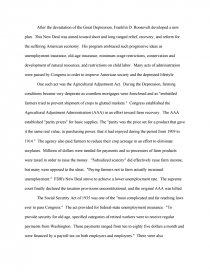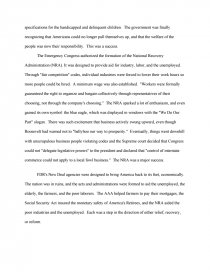Fdr's New Deal
Essay by review • February 19, 2011 • Essay • 628 Words (3 Pages) • 1,773 Views
After the devastation of the Great Depression, Franklin D. Roosevelt developed a new plan. This New Deal was aimed toward short and long ranged relief, recovery, and reform for the suffering American economy. His program embraced such progressive ideas as unemployment insurance, old-age insurance, minimum-wage restrictions, conservation and development of natural resources, and restrictions on child labor. Many acts of administration were passed by Congress in order to improve American society and the depressed lifestyle.
One such act was the Agricultural Adjustment Act. During the Depression, farming conditions became very desperate as countless mortgages were foreclosed and as "embattled farmers tried to prevent shipment of crops to glutted markets." Congress established the Agricultural Adjustment Administration (AAA) in an effort toward farm recovery. The AAA established "parity prices" for basic supplies. The "parity was the price set for a product that gave it the same real value, in purchasing power, that it had enjoyed during the period from 1909 to 1914." The agency also paid farmers to reduce their crop acreage in an effort to eliminate surpluses. Millions of dollars were needed for payments and so processors of farm products were taxed in order to raise the money. "Subsidized scarcity" did effectively raise farm income, but many were opposed to the ideas. "Paying farmers not to farm actually increased unemployment." FDR's New Deal strove to achieve a lower unemployment rate. The supreme court finally declared the taxation provisions unconstitutional, and the original AAA was killed.
The Social Security Act of 1935 was one of the "most complicated and far reaching laws ever to pass Congress." The act provided for federal-state unemployment insurance. "To provide security for old age, specified categories of retired workers were to receive regular payments from Washington. These payments ranged from ten to eighty five dollars a month and were financed by a payroll tax on both employers and employees." There were also specifications for the handicapped and delinquent children. The government was finally recognizing that Americans could no longer pull themselves up, and that the welfare of the people was now their responsibility. This was a success.
The Emergency Congress authorized the formation of the National Recovery
...
...

